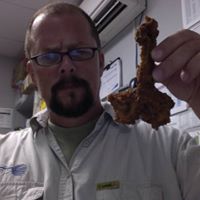Leaderboard
Popular Content
Showing content with the highest reputation on 07/20/2012 in all areas
-
I am trying to understand the relationship of a "high risk of diabetes" A1c and Blood Glucose Level as it concerns the primary diagnosis of diabetes. The scenario is a 72 y/o slightly overweight female that receives a consult at an urgent care clinic. Her chief complaint is "just haven't been feeling very good". Patient request blood testing. Physical examination is negative. Her BGL is 105 mg/dl and her A1c is 6.2 %. My questions are these: 1. Is the A1c only relevant in the diagnosis of diabetes because her BGL is over the threshold of 100 mg/dl? 2. If she lowered her blood glucose through diet and exercise would the A1c become less relevant or is an A1c of 6.2% have a free standing relevance? 3. Should the patient modify diet and exercise and have the test performed again after she seeks a consult with an internist?1 point
-
To Whom It May Concern: Writing this letter for me is two fold. I was an EMT and Paramedic student when my life was thrust in a different direction all together. On the night of March 20, 2012 I was involved in an MVA when a semi-truck driver hit me on the driver's side of my truck at 35 mph. This left me unable to work in my field as I had a compound fracture of my left leg and a pretty severe head injury. After speaking with one of the responders and a friend of mine, I soon found that almost none of the equipment worked on me because of my size at the time. Although my life was spared by the people who responded and the care that I received it should be known that this happened. My friend told me that the C-Collars where to small even the "no-neck" size, and they tried using a towel with tape but because of the amount of blood this didn't work either. My friend also informed me that they had to have people ride in the back of the ambulance to hold traction on my leg, as well as hold C-spine manually. Given these factors I would like to work with someone to help develop a class of equipment that will fit everyone and not just be a one size fits all. While I have been working diligently on reducing my size and making myself more fit there are those that simply don't have the drive or the ability to do the same thing, along with that even when I do lose more weight I am sure that given my natural size there will be some equipment that still won't work on me. I am at a loss of who to write or who to let know about this so I have written this letter in hopes that it might reach the right people. I am not looking for compensation out of this I simply want to make sure that when a Paramedic responds they have the ability and equipment to handle every situation they might come across. Remembering that I have worked in various places myself where the population was different in sizes ranging from the smallest infant to people well over 600lbs, I want to work together with a manufacture or someone in the business of developing equipment used in life saving emergencies to ensure that this doesn't happen to anyone else. Given this letter is indirect to whomever might be able to assist in this I ask that if you find yourself wondering more about my story or would want to work on this feel free to email me at jlchernov1977@gmail.com, this is my personal email and I will respond to all who might ask. Thank you for taking the time to read this letter and hopefully we can work together to make sure that all patients can be helped efficiently. Sincerely, Jacob Chernov, AZ EMT -Basic1 point
-
1 point
-
This is just awful. I can't even imagine how the families of the victims are feeling here. Thoughts and prayers go out to them, even though I'm not praying much anymore. I would like to applaud the members of this site by the way. Every other forum I've been to this morning has had huge explosive arguments between people pushing different agendas and using this tragedy to emphasize their point. On all sides. It's absolutely disgusting and unforgivable. This is the first online place I've been where no one is using a tragedy to forward their own political crap. Good for the City.1 point
-
First, let me say that I am replying from a point of view where I weigh in excess of 300 pounds. So, I am not picking on anyone. As you said, it would be impossible to have a "one-size fits all" solution. So, that would leave us with the burden of carrying equipment to fit anyone from an infant to a morbidly obese adult. So, this would beg the question: how do we balance the need to provide for any contingency with the financial reality? With the space limitations of a modern ambulance? Let's take the example to an extreme: What do you do when the morbidly obese (>500 lbs) arrests? Will a Lucas device work? Is there room for a bariatric stretcher and three or four crew members in the back of your ambulance? How will you perform CPR? Can we reasonably expect to be prepared for every contingency on the ambulance?1 point
-
I hear you man and I sympathize with you and share your concerns as a provider who frequently attends to patients who have simply surpassed the size limit we are typically equipped to deal with. We don't like to think or talk about it, but the truth is in many EMS systems across the country, there are patients who, due to their size, will suffer adverse outcomes because we simply do not have the ability to provide the same level of care to them as we do others. We've all been in the situation where we could not get an IV on an obese patient; and some of us have even been in the situation where not even our IO's are large enough to deal with it. As we as Americans increase in size, we will have to work faster to find solutions to this difficult problem. The most effective solution would be for everyone to be more conscientious about their weight and health, and to take preventative measures to avoid obesity and to get help for it if they have already crossed that bridge. Unfortunately losing weight--especially a lot of weight--is a lengthy and arduous process and while I haven't seen any numbers, I don't imagine that the rate of obesity is slowing down anytime soon. We in EMS can be proactive in tackling this problem by first and foremost recognizing the need for bariatric equipment and making sure that we have access to it. We can also be a force of good by implementing community health initiatives designed to identify, prevent, and treat obesity within our communities. The sad fact is that people have and will continue to die not for lack of effort on the part of EMS agencies, but due to the simple lack of ability to deal with severely obese patients. That should frighten people. That should mobilize EMS providers and their medical directors to immediately take actions to address the problem; it should also frighten those patients, and make them realize that their obesity can not only cause them to have serious and life-threatening emergencies, but also prevent them from receiving the needed care due to equipment and provider limitations. I commend you for taking steps to make yourself healthy, as well as for your recognition of the need to take a proactive stance in preventing future patients from experiencing the same issues as you did. I would suggest to you to approach your local EMS system and to talk to them about what their capabilities are for bariatric patients, and where their weaknesses are. From there, you can help mobilize your community to provide whatever support the service may need to ensure that they are properly equipped to handle patients of every size, no matter what their emergency is. Take care, -Bieber1 point
-
I realize that this story is more about whether the family can sue or not, but I think our discussion is moving more towards the care that was rendered. I just read through the court documents provided by eb1040. It makes for some interesting reading. It did leave me with a few questions: 1. Did Medic 9 ever make it to the scene? There are some places that say yes and some that say no. If they did, why didn't they transport and provide care since they would have been the higher level of care? 2. The summary states that the ambulance arrived on scene at 5:16. Is this the time they arrived on scene or the time they truly made contact with the pt? With the call being a shooting, did they post around the corner waiting for police to clear the scene? If so, is 5:16 the time they posted or the time they actually made it to the pt? 3. The plaintiffs expert witness is a medical examiner. Is this person truly an "expert" in the field of emergency medicine, prehospital care or trauma care? Did the hospital that was "only minutes away," actually have a surgical team ready to take this person to the OR at 5am or would they have needed to be called in from home? Would they even be able to handle the trauma since they are not a trauma center. I can tell you that from working in a community hospital, if a trauma pt codes, I am not cracking their chest. Even if I could get ROSC, there is no way that pt is going to make into an OR, much less out of it. At a trauma center, it is a different story but the chances of survival are slim to none. I'm also curious how the good doctor came to the conclusion that the patient would have had a 20-30% chance of survival with a more rapid transport. That is being overly generous even under idea conditions at a trauma center. I judt did a little research on this hospital. Muhlenberg is a satellite ER and is not a fully functioning hospital. From their website (http://jfkmc.org/sat...ency-department): What is a Satellite Emergency Department? A satellite emergency department is distinct from an inpatient, traditional hospital. With the exception of trauma, it has the same capabilities as conventional Emergency Departments, 24 hours per day, seven days per week – with all the necessary personnel and emergency equipment. By state regulations, a satellite emergency department must be part of a system with a nearby acute-care hospital such as JFK Medical Center. So there is nothing that would have changed the outcome. There is no surgical service at the hospital and they specifically state they cannot deal with trauma. This is just another family looking for their lottery ticket.1 point
-
The problem is, it is almost 100% impossible to perfectly fit any item, to any patient. Nothing is an absolute fit. Hell, different manufacturers "no neck" or "neckless" aren't even the same size. Back in the day, they had vacuum splint collars. I bet that could be used well and good, but I bet you could also accidentally kill your patient with one. The only thing I could recommend, is having a few soft collars, eg Philly Collars, the foam ones. And a few of the really soft ones, the white soft foam filled ones. The solution won't be simple, because of neck width, so the collar will have to be longer. And many spine boards have a 500lb cut off, I've seen some bent to their limit. So I'd suggest building up with a board on like a Reeves.1 point
-
It would seem that if you make contact with persons at the scene of the MVA, you have initiated patient care. If you leave the scene without transferring patient care or obtaining written refusals, you would be guilty of abandonment. So, the question is: whether to make contact or not. I would have to say in most cases, you should make contact and wait for other responders to arrive. Of course, you will have to weigh that decision in the light of your current patient as well as the potential for injury of those in the MVA. In any case, be prepared to document and defend your decision. It is an ugly hypothetical.1 point
-
Hey guys. Last time I was on here 2 months ago I was in a downward spiral after a bad ending of a relationship and the stress of paramedic classes. Well good news is I have put back most of the pieces together and im ready to re enter to forum with productive posts. So Im back to stay. And in less than five weeks I will be sitting for my national registry at the paramedic level and be starting pre nursing for my BSN to gear me up for med school.1 point
-
Back in the "real" old days a youing upstart gunslinger would attempt to pick a fight with a seasoned infamous gunslinger known all over for his quick draw. What the kid didn't realize was that if he killed the older gunslinger, he would become notorious as the man who killed him. Every upstart would then be gunning for him. No matter how fast the kid became, there was always going to be someone faster. Relating this to the EMS field, there are always going to be better medics than we are. We shouldn't compare ourselves in that way. Each of us have our own talents and abilities that make us the good medics that we have become. I have seen numerous (unfortunately too many) "cocky" medics that are so highstrung and egotistical that they would not turn a scene over to anyone other than their own fire service resulting in turmoil on the scene. I have heard derisive remarks made from FF medics to private ambulance services responding. After the particular FF medics assessed the patient, packaged him, and finished on the scene they would yell over to the private service to bring their cot. (The reference was to "cot jockey"). No one wins when this happens. We are professionals and should act accordingly. The way we conduct ourselves is of utmost importance. If we act and see ourselves as professionals others will see us as professionals also. I have never worked as a FF medic but have spent most of my time in a private owned ambulance service running 911 calls and transfer calls. Transfer medics / emts develop certain skill sets that include aspects of nursing as well as those taught in EMT and Paramedic school. When the FF medics actually transport, it is usually a short distance to the local ED. The Transfer medics/emts actually have a more involved transport with patient contact that can take hours. The medic must be alert to patient changes over the length of time and treatments given must be documented accordingly.1 point
-
I've taken on-line / distance and traditional university classes. I've also worked with people who've taken paramedic programs where the majority of the course delivery was on-line. Personally, I wouldn't choose to take paramedicine on-line, if I had the option for classroom education. I think some of the most valuable moments in paramedic school were when one of the instructors went off on a tangent about an atypical presentation they saw, or a time they made a mistake, or some of the common prehospital pitfalls in a given situation. There's also a danger when you do self-directed learning that you go off on a tangent learning about something really interesting, like the pharmacology of opiate metabolites, that might have some small application to prehospital care, but might represent time better spent focusing in a different area. If you have a decent program, getting to run scenarios and play with equipment and simulators on a regular, near-daily basis is also really valuable, and hard to reproduce in a distance format when you may only meet up with classmates once very couple of months for a week or two. I wouldn't say "Don't do it", if it's the only option, just that I wouldn't choose to do it as a first choice. I felt that many of the medics I worked with who had done a distance delivery course were underprepared when they first hit the road, but that the gap narrowed over a few years once everyone had a base of experience.1 point
-
Looks to me to be nearly exactly what he asked... I wouldn't accept the online courses, though I'm afraid that I don't have an intelligent opinion on whether or not that they are good enough or not. I just learn better in a class, from the questions of the other students, from the group discussions and interactions. Particularly with the classes that you mention. I found my introduction into cardiology to be really, really hard. It's hard for me to imagine you being able to manage your way through it, and REALLY get it if you have to sort through it mostly on your own. As I said, I wouldn't accept the online courses, but I'll never again take another online course if I can avoid it. But that's my personal bias. I'd be interested to know what you decide, and how you come to feel about your decision after you've had a bit of time to live with it and understand it. Good questions man....1 point









